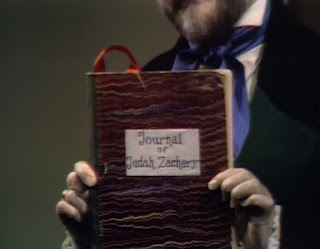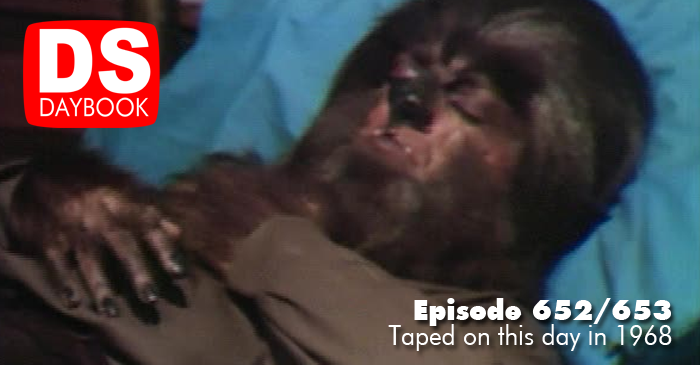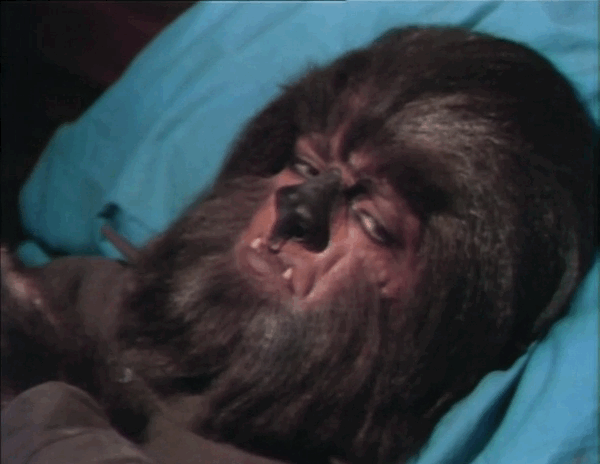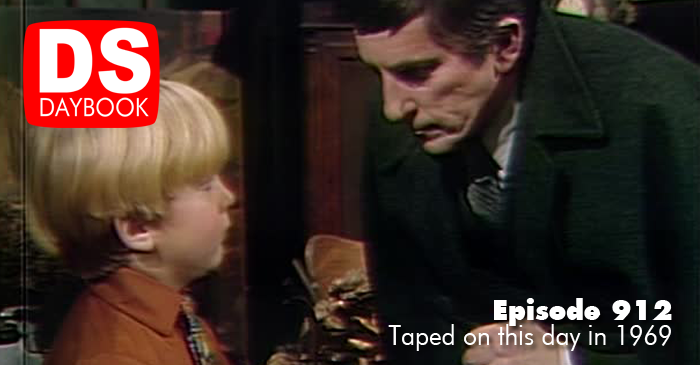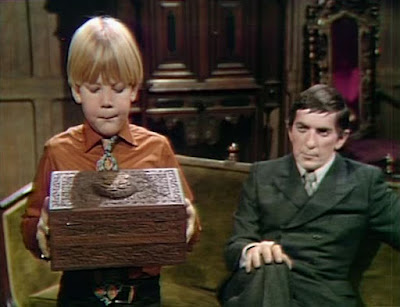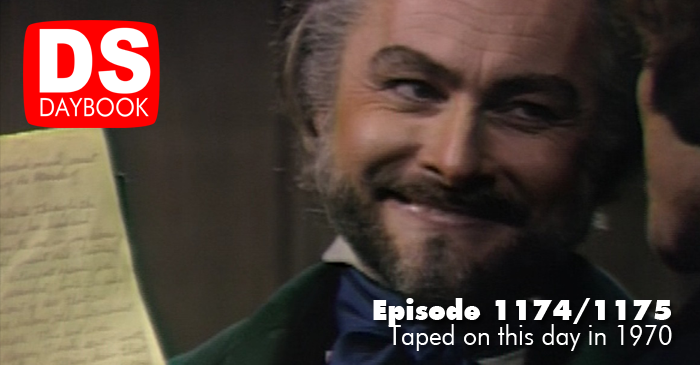
By PATRICK McCRAY
Taped on this date in 1970: Episode 1174/1175
As Quentin’s trial heats up, why do Letitia and Desmond find themselves on the stand for crimes of the black arts? Letitia: Nancy Barrett. (Repeat; 30 min.)
Samantha is confounded when her actual “Joanna Mills “ plot seems undone by an actual ghost. Gerard and Dawson plot to draw in Letitia into the trial. The next day, her testimony accidentally hangs Desmond with the blame for bringing the head to Quentin. Desmond is discharged as advocate and charged with witchcraft, too.
So, he spells it ‘Zachery.’ Well, there you go.
And in such a nutty font. Why not? Especially when he uses it in a book that gets Desmond, Quentin, and Letitia -- by implication or by quote -- by the short hairs. One of the reasons I prefer the 1840 witch trial to the one 45 (or 3-ish) years prior is that, in this case, there’s vaguely more to have a trial about because the defendants, technically, are kinda/sorta guilty of some of the things ostensibly in the same neighborhood as the charges. It brings a challenging ambiguity to the event, and I can’t say that about 1795. It actually has something in common with the Scopes trial. Beyond the fact that John Scopes taught evolution in neither Dayton nor Collinsport.
In both of the cases, the issue -- as pop history understands it -- was not whether the practices of witchcraft and evolution were right or wrong. It was whether or not someone had broken a law. It was illegal to practice witchcraft. It is illegal to evolve in Tennessee. Quentin and Desmond certainly give them plenty of material to work with, and when I watch it, I feel like one part of culture is grabbing the other by the lapels in an attempt to talk some horse-sense.
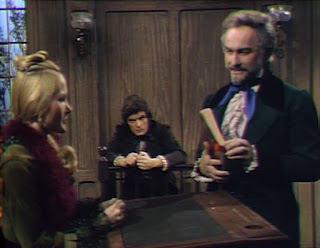 And my, how culture has changed since Victoria’s trial. Fascinating how it’s transformed in the time since we met a ghost named Quentin, as well. In those instances, you can see snapshots of progress headed to now. Vicki, for instance, had nothing to do with witchcraft. It was an evil practice that caused misery to all. Well, all except Angelique. These things had to be secret at one time, even if tangentially involved. Victoria was from the future, for instance, and this secret would be her undoing, seen as the height of black magic. Barnabas was familiar with her secret, but gained understanding with it -- as did the audience. Little did he know that one day, by living in the future, Barnabas would be living in Victoria’s secret. And fighting for the future of it.
And my, how culture has changed since Victoria’s trial. Fascinating how it’s transformed in the time since we met a ghost named Quentin, as well. In those instances, you can see snapshots of progress headed to now. Vicki, for instance, had nothing to do with witchcraft. It was an evil practice that caused misery to all. Well, all except Angelique. These things had to be secret at one time, even if tangentially involved. Victoria was from the future, for instance, and this secret would be her undoing, seen as the height of black magic. Barnabas was familiar with her secret, but gained understanding with it -- as did the audience. Little did he know that one day, by living in the future, Barnabas would be living in Victoria’s secret. And fighting for the future of it.In 1897, Quentin II was a decent guy, eventually, despite the dark rites. Just grab a blue candle and look past them. But by the filming of the 1840 sequence, there were new household names to learn along with a new spiritual ethos on the rise. Sybil Leek and Jane Roberts, specifically, were names to know. Dark Shadows, itself, was an agent of pop cultural reevaluation. Edgar Cayce books were getting regular reprints, appealing to what would morph into the New Age movement over the next ten years. TIME Magazine asked if God were dead. It was finally a good time to be an occultist. Quentin and Desmond approach the black arts in Victorian finery, bearing full heads of hair, with matinee idol good looks and the intentions of benevolent pseudoscientists. They are not victims of mistaken identity, although they keep the occult jazz on the downlow. The villain is an ignorant society guided by the agendas of Gerard and Lamar. And the implication is that the audience will be cool with that. I suspect that’s the case. If the 1840 storyline is a herald of progress, it’s in that regard, because we’ve seen much of the rest of it before. As with much of the show, it’s cyclical storytelling; Dark Shadows returns again and again to do variations on specific themes, characters, and plot turns. Later variants may or may not be as lovable as earlier ones, but they’re always enlightening and always suitably different. In this case, what happens if we do exactly the same trial, but invert almost every important detail… down to the one-time and seeming powerlessness of Barnabas, himself.
The result is a vicious, tight courtroom drama with high suspense and genuine food for thought. This is what you get for messing around with a disembodied head. But enough about the Scopes trial.
This episode was broadcast Dec. 24, 1970.

